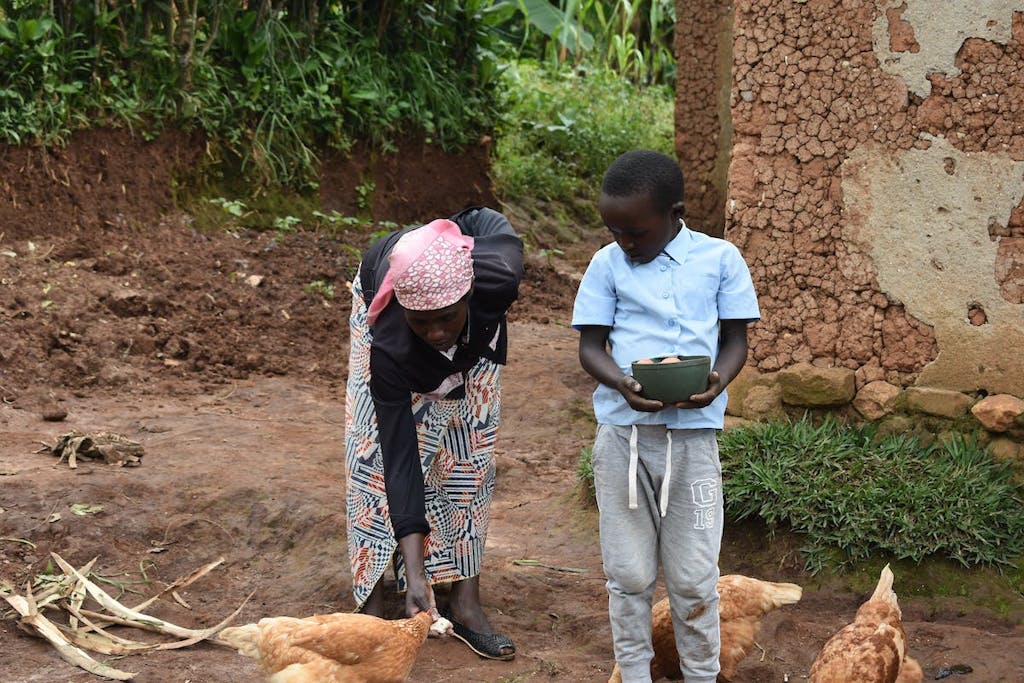Each year, we create the Food for the Hungry Gift Catalog. But this is not your typical catalog! These gifts allow individuals and families living in some of the most challenging places in the world work toward a better life.
Last year, many sponsors and donors–people just like you–purchased items like chickens, deworming medication, dignity kits, and even wells from the Food for the Hungry Gift Catalog to help families in need. Pierrine, who received chickens to help her 9-year-old son recover from malnutrition, is just one example.
The Gift of a Chicken Keeps on Giving
Chickens can be a valuable source of food and income. That’s why Food for the Hungry serves communities with programs that distribute livestock. FH began working in Nyabibugu Community, Rwanda in 2017. That is where FH first met Pierrine’s family.
“Before FH’s intervention in our community, most of us (mothers) were not aware of balanced diet preparation and its role in our children’s growth,” Pierrine explained. “Thus, our children used to suffer from malnutrition and its related diseases. In addition, it was difficult to get basic needs like food and clothes for our family members due to very low income,” she added.
Thanks to working with FH, Pierrine has learned how to prepare a balanced diet. Because someone chose to purchase from the Food for the Hungry Gift Catalog, Pierrine was given a chicken that lays eggs that she feeds to her children. With help from FH Rwanda staff, she has also acquired skills that help increase her income from farming activities. Pierrine says that chickens are definitely contributing to the well-being of her family.

Deworming Medicine: A Gift of Wellness
In many communities, children suffer from illness. One common cause of the illness is intestinal worms. Food for the Hungry provides deworming medication to affected families. Eraste, a 6-year-old boy living in Burundi, suffered from a variety of diseases, including intestinal worms.
“From the time I realized that Eraste was not healthy at all, I came to hear about a deworming campaign. Children have to take medicines so that they become strong and healthy,” explained Eraste’s mother, Odette.
Odette and her family began participating in FH programs in 2018. Very soon after Eraste was treated with deworming medication, he began to recover.
Eraste says he is very happy about the treatment. “I am really glad that I can now attend school, play with friends, and also can help with some home activities. Full of joy, I can now also dance and smile,” he said.

What’s a Dignity Kit –and How Does it Have a Lasting Impact?
In many parts of the world, young women miss out on school regularly because they are afraid traditional methods of taking care of their monthly menstrual cycle will fail them and leave them embarrassed in public. Food for the Hungry gives young women a chance to stay in school through the provision of Dignity Kits.
Menstrual hygiene promotion is one of the most important aspects of FH Kenya’s Child Sponsorship programming. Dignity kits provide girls with disposable feminine hygiene products that can get them through the school day more comfortably. The kits enable uninterrupted school attendance for girls in resource-limited settings and boosts the confidence of these vulnerable girls during their monthly menstrual cycles.
Improved menstrual hygiene is leading to better education outcomes for FH sponsored girls. Kame, an orphan living with her siblings in Marsabit County of Kenya, benefitted from receiving a Dignity Kit and staying in school, because someone like you gave a kit through the Food for the Hungry Gift Catalog. Now, as one of the older girls in the community and with the help of FH staff training, she mentors the younger girls, teaching them how to use their kits and encouraging them to keep up with their classes.

Continue reading
Deworming Tablets Help 11 Year Old Thrive: Dodos’ Story – Food for the Hungry
Four Social Causes that Leaders in Christian Media Care About
Why Your Disaster Donation Matters So Much – Food for the Hungry


